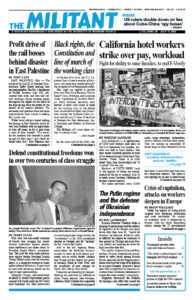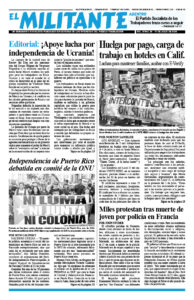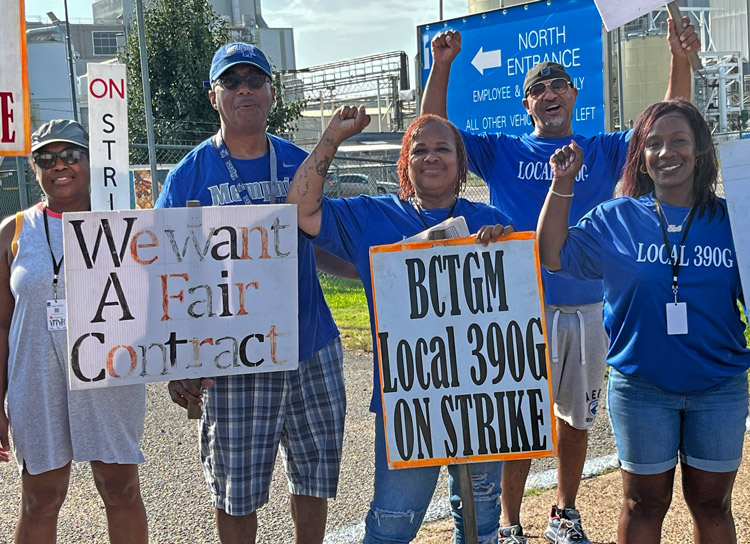MEMPHIS, Tenn. — “This strike is about respect,” Tonya Walker, a 21-year employee at International Flavors and Fragrances and member of Bakery, Confectionery, Tobacco Workers and Grain Millers Local 390G, told the Militant on the picket line here. “We were essential workers during the COVID crisis. Sometimes we were working 16-hour days because co-workers were out sick. Now they want to take away our overtime pay and change our benefits. They don’t respect us. They can’t run this without us. This is day 22 and there is nothing coming out of the dryers!”
Some 200 union members walked out June 4 after working under the terms of an expired contract for almost a year. This is the first time they’ve ever been on strike. Their picket signs read, “Don’t mess with Memphis; We’re a union town” and “We feed your family, now it’s time to feed ours.” Some of their tents were blown away in a storm the week before, but they’re determined and optimistic.
They produce soy protein products used by Nestle, Nestle Purina, Abbott, Kind Bars and other companies to make baby formula, pet food, nutritional powder and beverages.
“You have to have it in your heart to do it right. You need to be mindful and conscious. People depend on this product for nutrition,” said Effie Graham, a 31-year worker. “All the company cares about is the almighty dollar, not us or the people who need these products.”
The bosses are pushing to take away paid lunch breaks, stop paying overtime after eight hours, and cutting contributions to workers 401(k) retirement plans. Health insurance costs have gone up dramatically for workers since the company changed insurers two years ago after International Flavors and Fragrances merged with Dupont.
“We’re paying too much, up to $800 a month premiums for family coverage,” striker Zandra Lee said. Last year the cost of an EpiPen was $12, this year it shot up to $600!”
Now the company wants the right to change benefits with only a month’s notice to the union. The current contract allows changes with a year’s notice. As a couple of workers explained, “It’s all taking and no giving.”
Cedric Wilson, a dryer operator at the plant and president of Local 390G, told the Militant that overtime after eight hours is important. “Sometimes they will work people for 16-hour shifts and then shut down the plant at the end of the week. If the company gets their demands we wouldn’t get any overtime pay in this case, because we didn’t work over 40 hours.
“Overtime isn’t voluntary. If they need people to stay, they start at the top of the seniority list. If the high seniority people don’t want to work, the low seniority people have to stay. And they can tell us at the last minute they need us to stay over.”
A couple years ago, during the pandemic, the company tried to hire in workers for $18 an hour, but couldn’t find anyone at that wage, strikers said. Trey Davis, a young worker who has been at the plant about a year, pointed to four or five other places nearby, including the railroad, where starting wages are higher.
Union fights for new hires
Wilson said the company asked the union leadership what to do to hold onto new hires. “We told them: You know what you need to do! Pay higher wages!” The company and union reached an agreement to hire new people into job classifications that start at a higher pay scale, $26 or $27 an hour. Davis and other new hires expressed strong support for the union.
“We had a good faith understanding with the company that in today’s negotiation we’d get wage increases for service employees as well,” Wilson said. But the company has only offered 4%, 3%, and 3% raises over three years.
“With inflation and higher health care costs that’s not enough,” he said. “We’re not being unreasonable, but the company won’t even come back to the table. They tell the media that they’re willing to talk but they tell us this is their ‘last, best and final offer.’”
“They keep talking about ‘market share’ and ‘market standards,’” Wilson added. “I’m not going to tell workers they can’t have a raise because the company only made $250 million in profits instead of $260 million.”
Wilson said some 20 people are currently working in the plant, a few union members who crossed the picket line as well as scabs brought in from strike-busting outfits like Huffmaster.
“We’ve had lots of support from other unions and the BCTGM locals in the area. Memphis is a union town,” he said. “I think we’re part of a movement to rebuild and defend the union movement. It’s a fight for all of us. Members of the Teamsters have been out here supporting us, as they’re getting ready for their own fight at UPS.”
Wilson encouraged supporters to come out and join the picket line, which is up 24 hours a day at 4272 S. Mendenhall Road here.
The strikers receive $205 a week in union strike benefits. The company cut off their health insurance June 30. Contributions are needed and greatly appreciated. The BCTGM International website has information on their GoFundMe page and a podcast on how to support the strike.
Betsy Farley contributed to this article.


